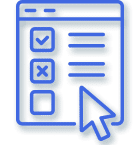What does an Addiction Counselor in Ohio do? What is Their Job Role?
Before you begin your first day as an official licensed chemical dependency counselor LICDC (or any other such counselor level) in Ohio, you need to complete several requirements. If you don’t yet have a college degree in the behavioral science field, don’t worry. In your state, you can still work as a licensed chemical dependency counselor assistant LICDC, as long as you have a high school diploma or GED.
You’ll still have to apply for the appropriate license and show proof of your educational qualifications. You’ll also have to take part in continuing education classes. Once you have accumulated the required number of continuing education (CE) hours, it’s time to apply online to take the relicensing examination. Once issued, your license is good for two years.
Compare Popular Online Substance Abuse Counseling Programs
Overview
Before you apply to take a licensing or renewal exam, you should know what these requirements are. This way, you’ll be able to find the CE classes you need, knowing they will be approved by the professional board.
You’ll be supervised as you work with residents or clients. This is clinical supervision, which is conducted by your immediate supervisor. Clinical supervision is required—it’s a form of mentoring that’s intended to help you develop your counseling knowledge and skills.
As a chemical dependence counselor, you should seek out and join at least one professional association. Having connections with other licensed chemical dependency counselors enables you to network; you’ll also develop friendships with other counselors.
Education Requirements

In Ohio, substance abuse counselors are known as licensed chemical dependency counselors. Depending on your education and experience level, you may be an assistant, a licensed counselor (at two levels), a licensed independent licensed chemical dependency counselor LICDC or a clinical supervisor. Your level of education affects at which level you’ll begin working.
For the two chemical dependency counselor LICDC assistant levels, a high school diploma or GED will suffice for your educational requirements. You will have to complete several dozen hours of continuing education courses for your license. As you read through the state of Ohio licensing website, you’ll notice that you have to be of a minimum age—18 years of age, for the two CDCA levels. As you work to reach the second CDCA phase level, you’ll learn that you should have held Phase 1 for a minimum of 10 months. Along with this requirement, you’re going to have to be careful about how many CE hours you obtain once you are granted CDCA Phase 1 status. The state structures this so closely, because the licensing board needs to ensure that Level 1 and Level II CDCAs are professionally ready to move to the next level.
Licensed Chemical Dependency Counselor (LCDC I and II)
You might think that, as you reach the next level (Licensed chemical dependency counselor II or LCDC II), you’ll need a bachelor’s degree from a college or university. An associate degree in a nursing or behavioral science field will be sufficient. At a minimum, you’ll be able to advance to this level in about two years—the amount of time it generally takes to earn a behavioral science associate’s degree.
With the Licensed Chemical Dependency Counselor III, you will need to have a bachelor’s degree in a behavioral science or nursing. You’ll also need 2,000 hours or one year of chemical dependency counseling experience, either in the form of an internship or compensated (paid) work. You’ll also have to document the hours you have put into practical experience of the 12 core functions. These functions are:
- Screening
- Intake
- Orientation
- Assessment
- Treatment planning
- Counseling (all forms)
- Case management
- Crisis intervention
- Client education
- Referral
- Report and record keeping
- Consultation with other professionals
Each of these functions requires different skills of you. You should know your clients very well so that, when it’s time to refer them to outside services, for instance, you’ll be better able to identify and contact the most appropriate resource for their needs.
Licensed Independent Chemical Dependency Counselor
The next CDC level is the independent chemical dependency counselor. Here, you need a minimum of a master’s degree in behavioral science or nursing. You’ll also have to prove your course work in ten content areas. You’ll have to have 2,000 hours of chemical dependency counseling experience. Again, this can be compensated work or an internship.
If you apply for a license at this level, you’re reaching a fairly high level. The clinical supervisor (CS) requires a minimum of a master’s degree, with provable course work in 10 content areas. You need two years or 4,000 hours of work experience (compensated or an internship). Expect to show proof of 2,000 additional hours of work experience as a clinical supervisor, working with CDCs.
CACREP Accredited Online Certification

Two types of accreditation are recognized in the United States; institutional and specialized. Institutional accreditation takes the entire institution into account while the specialized focus on professional preparation programs. The Council for Accreditation of Counseling and Related Educational Programs (CACREP) is a specialized accreditation that focuses on behavioral science master’s and doctoral degree programs in counseling at colleges and universities worldwide. Only already-accredited institutions are eligible for CACREP review. The review for accreditation will center on programs offering graduate degrees in counseling.
Find Your Online Addiction Counseling Program
Choosing a CACREP-accredited program ensures that the program meets the highest of quality standards. Many counseling specialties are accredited bythe CACREP, including addiction counseling. Accredited addiction counseling programs prepare individuals to work with those affected by addictive behavior and their families. Addictive behaviors include alcohol, drugs, food, gambling, sex, and anything else that negatively affects your personal or work life by creating addiction behaviors.
CACREP-accredited programs will focus on treatment models and the phases of addiction including prevention, recovery, and relapse prevention. These 60-semester hour programs will include the application of interventions. When students choose a CACREP-accredited program they can be confident that:
- the program meets or exceeds national standards
- the program will focus on professional counseling rather than psychology oreducation
- the program has an excellent reputation
- CACREP graduates statistically receive higher scores on the National Counselor Examination for Licensure and Certification (NCE).
- the requirements for licensure will be met.
Alcohol and drug ounselor, Social Worker, and Marriage and Family Therapist Board
The Ohio alcohol and drug counselor, Social Worker, and Marriage and Family Therapist Board has the responsibility of protecting Ohio’s consumers of mental health services. The Board establishes and enforces licensure and practice standards for professional counselors, social workers, and therapists. Each of these three counseling fields has a committee designated to review licensure applications and regulate the specific field of practice.
Address
77 South High Street, Room 2468
Columbus, OH 43215
Phone
(614) 466-0912
Website Address
Licensure:
- Licensed Professional Clinical Counselor (LPCC)
- Licensed Professional Counselor (LPC)
Counselor Testing & Examination Process

After you file an application for licensure, you’ll be pre-registered for the licensure exam. You’ll be given a username and password in application email. These are to be used to register for the examination when you schedule your date, time and location. These usernames and passwords are valid only for six months, so schedule as soon as you receive them.
You’ll have three hours to take and complete your exam. You’ll get the preliminary results of your exam on the same day; official results will be sent to you one to two weeks later. If you don’t pass the test, you can reschedule (and pay a new exam fee), but you have to wait at least 90 days before you take the test again.
The exam is computer-based and given at several regional sites in Ohio and the states that border Ohio. Exams are given Mondays through Saturdays.
Whether you’re applying for your initial license or renewing it after several years as a chemical dependency counselor, Ohio does require its licensed independent chemical dependency counselors, as well as other professionals, to complete specific steps in the application process.
Gather all of the paperwork and documentation you need for your application. This includes your educational program, documentation of the hours you’ve put in as a licensed independent chemical dependency counselor. Pull your documentation of required education and training together as well. You may need to contact your high school, community college or university to request official transcripts. Because it takes time for educational institutions to process your request, ask for this when you first begin preparing your application for initial or renewal licensing. Once you have all of this, provide documentation of the required practical experience hours—this may be in an internship or an official, compensated job role.
The form you use to apply for initial or renewal licensing will tell you what documentation you need to provide. This includes the hours of paid or volunteer work that’s applicable to the field in which you are being licensed. You’ll also have to provide documentation of the required levels of education and training you have received. Add items such as original transcripts, letters of participation and certificates of attendance at workshops. Next, you’ll have to gather documentation of the practical hours you’ve completed.
In Ohio, at least, you are required to report felony charges and convictions to the board in your application. This includes the circumstances of each felony—which includes active addiction. If it applies to you, answer honestly. Because you will be subject to a criminal background check, any criminal record will be revealed.
Ohio has an interesting provision in its licensing process. If you have a valid and current Licensed Chemical Dependency Counselor II, Licensed Chemical Dependency Counselor III, LICDC or LICDC-CS are eligible to apply for an endorsement in gambling disorders by simply filling out the endorsement application.
Clinical Supervision Explained
Every licensed independent chemical dependency counselor in Ohio is required to receive clinical supervision. Because you are working with damaged individuals who suffer from an addiction and a possible related co-morbid disorder, you are charged with a huge responsibility. You also have ethical and legal responsibilities. Hence the need for clinical supervision.
Your clinical supervisor should be fully aware of the rationale behind clinical supervision. In this way, they can guide and mentor you. You won’t have to be supervised for every hour that you spend working with your clients. Your clinical supervisor will use a specific ratio in providing clinical supervision. This may be 15-to-1 or 20-to-1, meaning you would be supervised for one hour of every 15 or 20 hours of client contact.
Your supervisor will have specific criteria they need to meet in supervising you and your fellow counselors. They are responsible for ensuring that each counselor reaches the level where they can be credentialed. Their supervision of you and any suggestions or recommendations they make will be with that goal in mind.
Next, each substance abuse facility has to remain accredited with specific accreditation bodies. This form of documentation helps to reassure prospective clients, residents and their family members as they try to decide which facility to enter.
Third, a well-supervised counselor can do a lot to help their assigned counselors to feel more confident in the work they are doing. This means fewer counselors will develop burnout symptoms, then decide to leave.
Clinical supervision enables the clinical supervisor, their supervisor and the counselors to identify any areas of liability with particular clients, if, for instance, a client suffers from a co-morbid disorder, such as depression. They may decide that suicide is the only answer for their depression and pain. The agency could potentially be held liable if staff members didn’t detect the signs of suicidal ideation.
Finally, even though counselors are held to a high level of ethics, some of them may cross emotional or physical boundaries with their clients. When they close their office door to begin a counseling session, what are they doing? If they have decided to abuse a vulnerable client, the agency will be held legally liable if the counselor’s abusive actions were not caught and stopped. Clinical supervision allows agencies and supervisors to be proactive, rather than reactive.
Renewal and Continuing Education

Every continuing education hour you choose must be approved by the licensing board. If you took a course that was not approved by the board, you can request approval once you’ve already taken the course. You’ll have to provide the course agenda and your course certificate to the board, so it can re-evaluate its earlier decision.
You’ll have to take courses in the following nine content areas:
- Theories of addiction
- Counseling procedures and strategies with the addicted
- Group process and techniques
- Assessment and diagnosis of addiction
- Relationship counseling with the addicted
- Pharmacology
- Prevention Strategies
- Treatment planning
- Legal and ethical issues in counseling
Potential Counselor Career Path Options
- Addiction Counselor
- Alcohol and Drug Counselor
- Behavioral Health Specialist
- Certified Addiction Drug and Alcohol Counselor
- Chemical Dependency Counselor
- Mental Health Counselor
- School Counselor
- Substance Abuse Counselor
Associations & Organizations
The Ohio Counseling Association maintains a list of associations for substance abuse counselors:
- American Counseling Association
- National Board for Certified Counselors, Inc.
- Association for Specialists in Group Work
Several of these groups are specific to drug and alcohol addiction. Others focus more on mental health or counseling.
